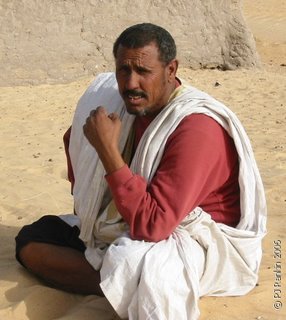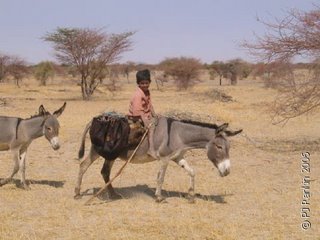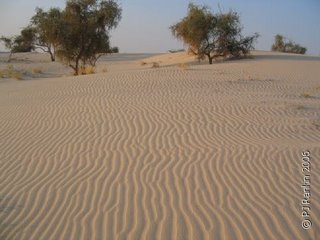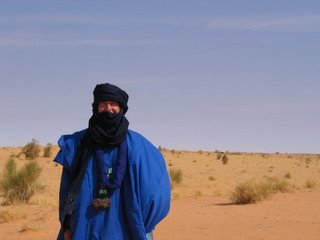Sand, everywhere sand.
The desert is a dangerous environment. If you've ever watched a water container that you can't stop leaking dripping into the sand from the camel plodding in front of you with two days still to go to the next well, you get a tiny idea of how uncertain is desert life. Many nomads have frightening stories of being lost in the endless dunes.
 Good friend 'Mr. One O'clock' Big Boudjema, whom Bob Geldorf recently featured, is one of those rare desert guides, a true 'pilot du desert'. He can find his way in the 'Azawad' North of Timbuktu, where there is no feature or vegetation in every direction to the horizon's curvature. In such places without reference points the eye becomes confused by scale - a small shrub closeby can appear to be a far off tree. Big Boudj can read the dunes and orientate from the colour, texture and even taste of the sand. He tells the tale of when he was called to try to find three lost cameleers from the salt mines on the Algerian border. Their camels had arrived at Arouane on autopilot without their masters. By following the occasional trace left from the lead camel's rope, they found one man still just alive, but the other two had died of thirst. The rescue party had to mark the dunes to find their own way back. As Boudjema says, you have to remember perfectly in order every single small landmark. Otherwise your tracks will be lost as a dunebug's.
Good friend 'Mr. One O'clock' Big Boudjema, whom Bob Geldorf recently featured, is one of those rare desert guides, a true 'pilot du desert'. He can find his way in the 'Azawad' North of Timbuktu, where there is no feature or vegetation in every direction to the horizon's curvature. In such places without reference points the eye becomes confused by scale - a small shrub closeby can appear to be a far off tree. Big Boudj can read the dunes and orientate from the colour, texture and even taste of the sand. He tells the tale of when he was called to try to find three lost cameleers from the salt mines on the Algerian border. Their camels had arrived at Arouane on autopilot without their masters. By following the occasional trace left from the lead camel's rope, they found one man still just alive, but the other two had died of thirst. The rescue party had to mark the dunes to find their own way back. As Boudjema says, you have to remember perfectly in order every single small landmark. Otherwise your tracks will be lost as a dunebug's.
Mohamed, our translator described how his grandfather took him into the desert at the age of 14. Saying he would be back in a few hours, he left Mohamed with a camel, some rice and a few days of water. The boy waited one, two nights but no grandfather. Eventually after trying to find his way, with water running out he met some travellers who gave him directions. Stumbling back to his home encampment just before a rescue party set off, Mohamed was welcomed back with a big celebration from his test of manhood. He says after that experience he will never ever be afraid of anything again. Passing a little boy riding barebacked by himself with a group of donkeys, I realise that his immediate environment and the local trails through the acacias must be as familiar to him as the streets are back home.
Passing a little boy riding barebacked by himself with a group of donkeys, I realise that his immediate environment and the local trails through the acacias must be as familiar to him as the streets are back home.
One day as an experiment I walked away from our small camp, trying to carefully note landmarks of dunes and vegetation. Rapidly the camp disappears behind the dunes and your tracks are quickly erased by any wind, leaving you uncertain of the precise direction back despite trying to remember the exact position of the sun. Your nice 'landmark' dune looks different from a slightly different direction. At night even in bright moonlight the white surreal landscape becomes unfamiliar and confusing. Salt caravans from the Algerian border navigate by stars during the cool of the night. But if there is no moon and the sky is obscured by clouds or dust, then they have to navigate by the direction of the dunes that form at right angles to the prevailing N wind, or the tiny piles of sand trailing on the leeward of any scrub. Will GPS make people blasé to these fiercely beautiful, but hostile landscapes? The constant mantra 'Insh-Allah'- God willing, and their Islamic humility and fatalism are understandable in such an environment. Their code places hospitality to strangers above all else. As they say, next time it could be you seeking help.
The constant mantra 'Insh-Allah'- God willing, and their Islamic humility and fatalism are understandable in such an environment. Their code places hospitality to strangers above all else. As they say, next time it could be you seeking help.



2 Comments:
Hi Paul
While doing a google search I came accross "Sand, everywhere sand" and saw the picture of Big Boudj.
Although I have so far never visited the festival I have been in Timbuktu several times. I do owe a house and a camel there and Boudj is a good friend of mine since he came on a 10-day camel trip to the tents near Araouane with my colleague Marianne and my "nomade brother" Mohammed.
I guess that you know that Boudj is not a Tuareg but a Maure (Arab speaking Hassaniya).
I wonder if the Hassaniya Arabs take place in NGO "Living Cultural Storybases" since I know a joung Arab student in Timbuktu who would be very interested in this program.
Best wishes
Iduna
Yes, I know Big Boudj is not a Tuareg.
More of the LCS work near Timbuktu can be seen on the French blog:
http://storybases-tamacheq.blogspot.com
or watch in English:
http://www.youtube.com/watch?v=GHB-yMoDhYo
We start with the Kel Tamacheq, but hope to make a good model for other minority ethnic groups to follow.
Post a Comment
<< Home